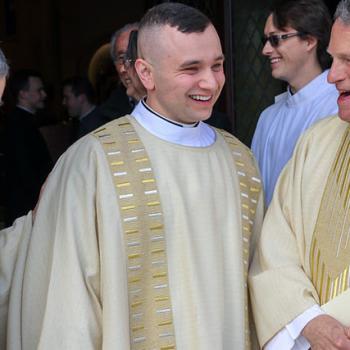In this respect, Dave's question suggests that there might be a number of fruitful reasons it is important that we come from an English tradition, the first of which must be that it reminds us that we are meant to be part of a larger whole. American religion too often emphasizes individual belief and religious experience.
Some of our Christian brothers and sisters, for example, foreground the importance of taking Jesus as one's "personal lord and savior," of having what they call a personal relationship with Jesus Christ.
Others flit from church to church seeking the one place that will perfectly match them and their beliefs.
Others still treat faith and spirituality as a smorgasbord from which they can take a little Buddhist mindfulness, a sprinkle of Islamic charity, a pinch of Benedictine order, and roll it all into wisdom they use for their own personal advancement. Churches or religious institutions become simply means to the end of individual salvation or enlightenment.
The Anglican tradition stands in contrast to the purely personal spirituality practiced by many Americans. Our tradition is broad, and it encompasses many practices and beliefs, but it also still suggests that the heart of human spirituality is not personal advancement but common praise, that we are saved not in our own bodies, but in corporate bodies.
Bishop of Texas Andy Doyle notes that as Episcopalians, "we believe that it is in Christian fellowship that we come to know Jesus in the power of the Holy Spirit, and that such stories are translated and interpreted through the eyes of worship and scripture…through fellowship, we discover our salvation."
The importance of community — that we are saved by and for each other, not by and for ourselves — is an ancient idea. St. Anthony the Great, the founder of desert monasticism, was surrounded by hermits who had fled civilization to seek enlightenment, but he knew that even for such radical individualists as the Desert Fathers and Mothers, "Our life and our death is with our neighbor. If we gain our brother, we have gained God, but if we scandalize our brother, we have sinned against Christ." That lesson is approaching two thousand years old, and many American Christians still have not learned it. But for those of us who descend from the Church of England, reminders appear daily in our liturgy, in our diversity, and in our commitment to common prayer.
We are spiritual.
We are religious.
And we are called to be those things in community.




